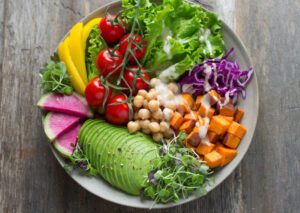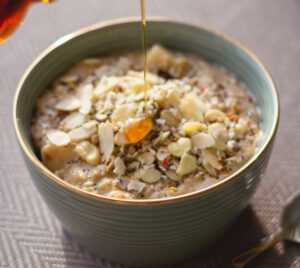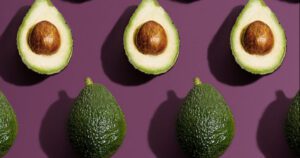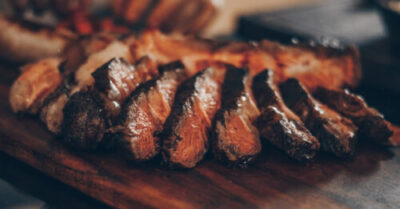Both nutrition and physical activity are crucial in gaining lean muscle. It’s essential to challenge your body through physical activity but without proper nutrition, you will not give your body the energy to recover between workouts.
Good nutrition is a key element needed to ensure that you train to the highest of your ability and improve the quality of your workout. In this article, I am going to give you a nutrition guide for building lean muscle to help you achieve the best results possible.
To build lean muscle you must include foods high in protein and low in saturated fat in your diet. You will need a balanced diet and a good exercise plan for best results.
High protein foods are very important for gaining muscle, but you also need a source of energy, carbohydrates and fats are also very important to provide this.
To gain lean muscle, you should focus on exercising regularly and eating more calories each day from foods that will help promote lean muscle growth.
Best Animal-Based Proteins for Lean Muscle Growth
1. Salmon
Salmon is a great choice of food for muscle building and overall health.
Each 3-ounce (85-gram) serving of salmon contains about 17 grams of protein, 1.5 grams of omega-3 fatty acids, and several important vitamins.
Omega-3 fatty acids play an important role in muscular health and may even increase muscle gain during exercise programs.
2. Eggs
Eggs are another complete protein source. One study showed that eating whole eggs after resistance exercise improves the way in that muscles use protein
They contain large amounts of the amino acid leucine, which is very important for muscles to grow.
Eggs also contain healthy fats, and other important nutrients like vitamins, which are important for a variety of processes in your body, including energy production.
3. Grilled Chicken Breast
Grilled chicken breast is one of the best proteins for lean muscle growth, as it contains a lot of protein. In just 100 grams, it contains 30-31 grams of pure protein.
Chicken also contains very little fat, a 100-gram serving only has about 165 calories and 3.5 grams of fats. This makes it a great food to build lean muscle.
4. Tuna
Tuna contains 20 grams of protein per 85 gram serving, it also contains high amounts of vitamin A and several B vitamins, nutrients that are very important for optimal health.
As well as salmon, tuna also provides large amounts of omega-3 fatty acids, which supports muscle health and research has shown that they can slow the loss of muscle mass as you get older.
5. Lean Steak
Steak is perfect if you want to maximize muscle growth. However, you don’t want to eat certain cuts, like Ribeye or T-bone steaks, as they are contain a lot of fat.
Sirloin steak is the best option as it offers plenty of high-quality protein for each serving. In 100 grams of lean steak it contains an impressive 21 grams of protein and only 140 calories.
6. Greek Yogurt
Greek yogurt feeds muscles, it contains casein, which may increase lean muscle mass.
Greek yogurt contains approximately double the amount of protein as regular yogurt, and eating it after a workout may be beneficial, due to its mixture of slow and fast digesting proteins.
7. Turkey Breast
In a 100 gram serving of turkey breast, it contains around 26 grams of protein and almost no fat or carbs making it perfect for building lean muscle.
Turkey could support various aspects of health, including muscle growth and maintenance, due to the large amounts of nutrients it contains.
Best Vegan Protein Options For Plant-Powered Gains

1. Seitan
Seitan is a popular protein source for many vegetarians and vegans.
It’s made from gluten, the main protein in wheat, and is also known as wheat meat. It contains around 25 grams of protein per 100 grams, making it one of the highest plant protein source.
2. Lentils
Lentils are a great source of protein, they contain 18 grams of protein per cooked cup (200 grams).
Lentils are also a great source of fibre, providing over half of your recommended daily fibre intake in a single cup (200grams).
3. Soybeans
Soybeans are considered a whole source of protein, as they provide your body all the essential amino acids it needs.
All three soy-based proteins (Tofu, Tempeh, Edamine) all contain, iron, calcium, and 12–20 grams of protein per 100 gram serving.
4. Chickpeas
Chickpeas are a legume and good plant-based protein. Chickpeas contain around 14.6 grams of protein per cup up and are also in high-fibre and low-calorie.
They are excellent also a great source of carbohydrate, fibre, B vitamins, and some minerals, they are a key nutrient in many diets.
5. Beans
There are many varieties of beans: white, black, kidney, and many more, all of which have high amounts of protein.
Most variations of beans contain around 15 grams of protein per cup (170 grams). They’re also excellent sources of complex carbs, fibre, potassium, iron, and many other beneficial plant compounds.
6. Nuts and Seeds
Nuts and seeds are an excellent source of plant-based protein and are a useful, quick snack. 30 grams contains 6 – 8 grams of protein, depending on which nuts you eat.
They are also great sources of fibre and healthy fats and contain antioxidants, amongst other beneficial plant compounds.
Best Carbs: The Energy Source for Muscle Building

1. Oats
Oats are a popular are source of complex carbohydrates and soluble fibre. One cup (80 grams) of raw oats contains 36 calories, including 55 grams of carbs, 11 grams of protein, five grams of fat and eight grams of fibre.
They are packed with vitamins and minerals that aid in the muscle-building process, reduce muscle soreness and promote overall health.
2. Sweet Potatoes
Sweet potatoes are full of natural sugars, dietary fibre and micro nutrients. They are full of vitamin B6, which can help maintain brain health, improving mood and energy levels.
They are easily digestible, and the benefits are quickly felt by the muscles.
Sweet potatoes are also a great source of beta-carotene. Your body converts beta-carotene into vitamin A, which helps with immune system.
3. Quinoa
Quinoa is one of the few plant-based complex carbohydrates that’s regarded as a complete protein, as it contains all the essential amino acids.
It contains around 40 grams of carbs per cup (190 grams), along with 8 grams of protein, 5 grams of fibre, and a large amount of magnesium.
4. Brown Rice
Brown rice boasts of a more complete nutritional profile to white rice. While white rice causes a bigger insulin spike due to its low fibre and fat content, consuming brown rice results in a sustained, slow insulin release.
One cup of brown rice contains 220 calories, including 45 grams of carbs, five grams of protein and 1.9 grams of fat. It also contains 3.5 times more fibre, more protein and more fat than white rice.
5. Banana
Bananas contain large amounts of carbs and potassium, that are both important for exercise performance and muscle growth.
They are among the best high carb pre-workout foods, with one medium-sized banana containing 90 calories, including 23 grams of carbs, 12.2 grams of sugar, 1.1 grams of protein and 0.3 grams of fat.
Top 5 Healthiest Fats: The Secret to Building Muscle

1. Avocados
Avocados are a great source of healthy fats, which not only help to increase muscle mass, but also improve HDL cholesterol levels and the quality of LDL cholesterol.
They are rich in fibre, and low in carbs, which are both components that promote weight loss. Research shows that people who eat this superfood are less likely to feel hungry within 5 hours than people who do not consume the fruit.
2. Coconut oil
Coconut oil is one of the best healthy fats to help build muscle as it is rich with nutrients and fatty acids, which helps to speed up your metabolism and burn existing body fat.
Testosterone plays a vital role in toning up and building muscle, and coconut oil helps to speed up the enzyme activity associated with the production of testosterone.
3. Low-fat dairy products
Low-fat dairy, like low-fat yogurts, and skimmed milk, actually have very little fat, but they do have all the nutrients that your body needs to build muscle.
Milk is a rich source of calories and protein. Studies show that drinking it after exercise may help you build muscle mass and support healthy weight gain.
4. Coconut milk
Just like the oil, dietitians recommend consuming coconut milk as a part of a healthy diet. It is rich in vitamins and healthy fats.
Coconut milk can be a good addition to your diet if you have a low-carb diet, as fats found in it can be used as an energy source by working muscle tissues.
5. Olive Oil
Olive oil has a key ingredient in a bodybuilders diet. Make sure to choose extra-virgin olive oil, as it has higher content of vitamin E, which keeps inflammation down after an intense training sessions
Monounsaturated fats in olive oil are useful in muscle tissue repair and enable a fast recovery. They also prevent muscle breakdown by lowering harmful cellular protein, liked with muscle wasting and weakness.
Building Your Personalized Muscle Building Diet Plan
Dieting plays a key role in building lean muscle. In order to build muscle you should add around 500-750 calories a day to your diet.
It is important to eat foods that are rich in complex carbohydrates and high quality protein sources, which can be from both animals and plants.
Your protein intake should be between 0.5 to 0.8 grams per pound of body weight to gain muscle. Some people will argue that it should be more, but most experts agree that this intake is adequate for regular lifters.
Conclusion: Your Path to Lean Muscle Gains
Using the information in this article you can now go and make yourself a bodybuilding building diet plan to build lean muscle.
Be careful to avoid processed foods and foods that contain sugar. use your calories wisely on foods with more nutritional value, like wholegrains, lean protein and good fats.
Building lean muscle is not easy, having a good diet plan is a step in the right direction, but by combining it with a lean muscle building workout and the correct supplementation to gain lean muscle, your results will be incredible.
I have written another article on foods that you should avoid when building lean muscle. Click here to view this article.
I hope you enjoyed this article and found the information in it helpful. If you have any questions about the article or about dieting in general leave a comment below and I will get back to you as soon as possible.
